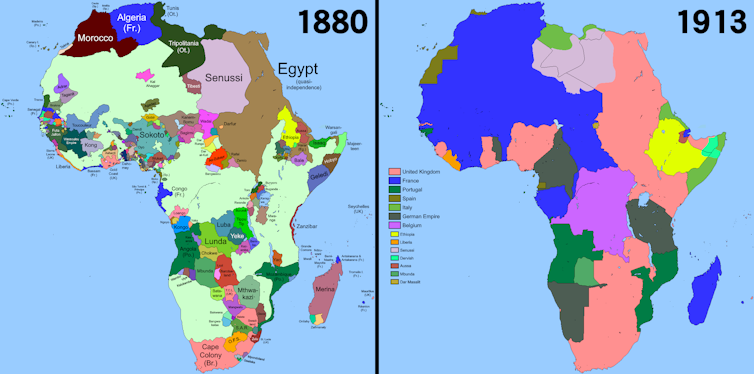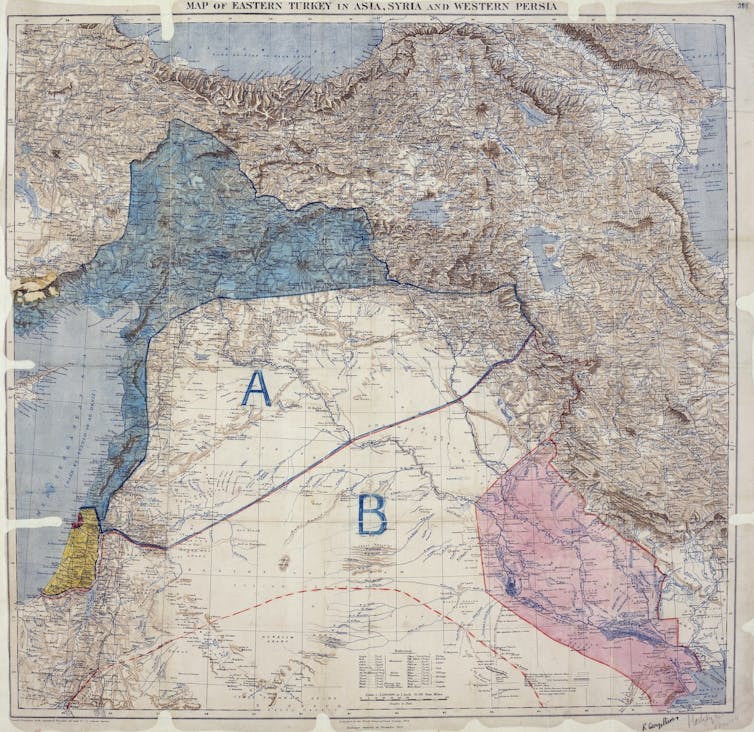With Trump at the helm, global politics is undergoing a seismic shift, where conflicts, hyper-nationalism, and a disregard for international norms increasingly overshadow the idea of diplomacy. As threats, wars and regional disputes dominate headlines, power struggles, rather than cooperative engagements, are shaping the global order. Trump’s return to the White House only amplifies uncertainty, making the coming years in international politics highly unpredictable. His recent rhetoric – marked by incendiary nationalism and unilateral assertions of power – signals an era of escalating tensions and declining diplomatic efforts.
The Trump doctrine: Anarchy in action
If we examine Trump’s recent pronouncements closely, we find a leader who thrives in chaos, a disruptor who challenges the existing orders. His concept of “national interest” – driven by a transactional and coercive approach – disregards conventional diplomatic norms.
His worldview aligns with the idea that the international system is anarchic, where international laws exist but lack enforceability, allowing powerful states to act with impunity.
Trump’s recent actions provide a troubling glimpse into this perspective. He has openly threatened countries in the US’s immediate neighbourhood, including Panama, Mexico, and Canada, suggesting a unilateral approach to regional politics. His floated the idea of purchasing Greenland – an outrageous revival of 19th-century expansionist ambitions – underscoring his perception of land and sovereignty as mere commodities for sale.
Most controversially, his suggestion of making Gaza a US territory by expelling Palestinians to neighbouring Arab countries reflects an alarming disregard for international humanitarian principles and the complex history of the region.
Furthermore, his hypocrisy is evident in his stance on immigration. While he enforces strict policies to prevent illegal immigration into the US – going as far as deploying the army at the northern border with Mexico – he simultaneously pressures Jordan and Egypt to accommodate Palestinian refugees. This selective approach exposes the inherent contradictions in his nationalist agenda, wherein US interests are paramount while the legitimate concerns of other nations are dismissed.
Trump’s double standards
Donald Trump’s approach to international politics exemplifies blatant double standards. His condemnation of South Africa’s land reforms as “very bad things” contrasts sharply with his policies of economic nationalism and strict immigration enforcement. While he opposes land redistribution aimed at correcting historical injustices, he aggressively pushes policies that prioritise American resources for Americans, ignoring similar concerns in other nations.
This hypocrisy extends further. He decries foreign intervention when it challenges US interests but readily interferes in Latin America, pressuring governments under the pretext of promoting democracy while turning a blind eye to human rights abuses by allies like Saudi Arabia. His administration criticised China’s policies in Xinjiang yet enacted the Muslim travel ban, barring refugees from war-torn regions.
On territorial disputes, Trump condemned Russia’s annexation of Crimea while endorsing Israel’s expansion into Palestinian territories. His ideas of purchasing Greenland and renaming the Gulf of Mexico to assert US dominance, reflect his selective application of sovereignty principles.
Ultimately, Trump’s foreign policy is transactional. He uses justice and democracy as tools for power rather than principles to be upheld. His rhetoric champions national interest, but his actions expose a pattern of self-serving hypocrisy that weakens global credibility.
The rise of pragmatic nationalism and waning influence of liberalism
One undeniable reality is that international politics is undergoing a major transformation. Rules and norms are changing, and states are increasingly prioritising their own national interests. As nations seek to navigate this unpredictable landscape, their preference for diverse and flexible partnerships has grown. This shift reflects a move from rigid alliances toward more transactional engagements, where ideological affinity is secondary to pragmatic benefits.
This is not the first time the global order has undergone such a transformation. Liberal values dominated in the post-Cold War era, with democracy and free-market economics touted as the ideal global model. However, today’s international system is defined by a clash between democratic and authoritarian governance, with no single power holding absolute dominance. Instead, we see an increasingly multipolar world where different nations assert their influence in different spheres, leading to heightened competition and strategic manoeuvring.
The erosion of liberal values has been a defining feature of the current political shift. Concepts once heralded as universal – freedom, democracy, security, and peace – are now facing unprecedented challenges. The rise of populism, xenophobia, and double standards in global politics has weakened the ideological dominance of the liberal order.
As nations turn inward, prioritising nationalist agendas over collective progress, the effectiveness of international institutions is called into question.
Also Read: Trump in White House: Is He Set to Cross Red Lines in International Affairs?
The power balance between global players is more evenly distributed than ever before. Despite its military dominance, the United States faces economic and geopolitical challenges from China. China’s growing economic and naval power, coupled with its assertiveness in the Indo-Pacific, has reshaped global dynamics.
This relative equilibrium has led to paralysis in international institutions like the United Nations, which have failed to uphold their foundational principles. The UN Secretary-General, reduced to issuing repetitive and ineffectual statements, exemplifies the institution’s diminishing authority.
Beyond geopolitical discontent, the decline of liberalism reflects a broader philosophical exhaustion, where the grand narrative of progress through openness and cooperation is losing traction. The post-World War II liberal consensus, built on the ashes of authoritarianism, now seems increasingly inadequate to address the complexities of technological disruption, climate change, and mass migration. As disillusionment with globalisation intensifies, new political movements, rooted in political nostalgia and economic protectionism—are filling the ideological void, signalling not just a temporary setback, but a fundamental shift in the global order.
A new turn to East-West rivalry
As ideological divides deepen, a renewed East-West rivalry is emerging. The US continues to lead the Western bloc, while Russia and China spearhead an alternative axis alongside Iran and North Korea. This geopolitical rift is likely to widen, further polarising international politics.
The involvement of major powers in regional conflicts exacerbates global instability. The Ukraine war is a clear example where US and EU support for Ukraine has emboldened the nation in its fight against Russia, prolonging the conflict.
Similarly, in the Israel-Hamas war, US backing Israel and Iran’s support for Hamas and Hezbollah have entrenched hostilities, preventing a swift resolution. The growing alignment of powers behind opposing factions in conflicts around the world signals a dangerous trend where proxy wars become the norm.
The growing East-West rivalry is reflected in the expansion of regional organisations such as the Shanghai Cooperation Organisation (SCO) and BRICS+. Countries like Saudi Arabia, Indonesia, Iran, and Nigeria have either expressed interest in joining or have already become members or observer states.
This geopolitical competition is also evident in Africa, where Eastern nations, particularly China and India, are expanding their influence, while traditional Western powers, such as France, are retreating. The conflicts in Sudan and the Democratic Republic of the Congo further illustrate this divide. In Sudan, regional actors like the UAE and the Wagner Group have played a role, while in the Congo, Uganda and Rwanda have been key players. The growing capabilities of these nations have intensified regional rivalries, further exacerbating the broader East-West geopolitical struggle.
The coming years are poised to be difficult for global stability. Trump’s force-driven, isolationist approach is set to undermine international cooperation further. His previous decisions such as withdrawing from the Paris Climate Agreement and sanctioning the International Criminal Court highlight his willingness to sideline multilateralism in favour of unilateral actions.
Also Read: Donald Trump’s Plans for Canada, Greenland and Panama Are Alarming
With other rising powers adopting similarly aggressive stances, the legitimacy of international institutions will likely erode further. The United Nations, once envisioned as a mediator for global peace, may continue its decline into irrelevance as major powers manipulate it to serve their interests. International law, already toothless in many respects, will be further sidelined as states increasingly operate on self-interest rather than cooperative principles.
The US and China, locked in a struggle for dominance, are likely to pursue aggressive containment strategies against each other. This competition will have far-reaching consequences for global trade, investment, and economic stability. With protectionism and strategic decoupling on the rise, the world economy faces potential disruptions, affecting both developed and developing nations alike.
Navigating an uncertain future
The future of world politics appears increasingly dark and unpredictable. As nations abandon traditional diplomatic engagement in favour of nationalistic and force-driven policies, the risk of conflict grows. The challenge for countries around the world will be to navigate this volatile environment carefully, ensuring their own security and economic stability while avoiding entanglements in unnecessary conflicts.
For international institutions, the task will be to adapt or risk irrelevance. Unless these bodies find ways to enforce international norms effectively, they will continue to be sidelined by powerful states acting in self-interest. The shift in international politics is unmistakable – diplomacy is being replaced by coercion, alliances by transactional partnerships, and rules by raw power. The coming years will test the resilience of the international system, determining whether it can withstand this new era of populism and anarchy or succumb to a world order that might make it right.
Amal Chandra is an author, political analyst and columnist. He posts on ‘X’ at @ens_socialis.
Anmol Kumar is a Research Assistant for an ICSSR Major Project at the Department of Politics and International Studies, Pondicherry Central University.











